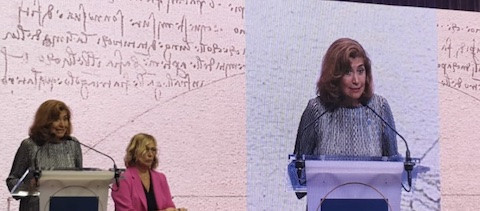
GCED Basic Search Form
Quick Search
Usted está aquí
Noticias

It is now well-known that women are not only bearing the brunt of the pandemic as they make up 70% of the health and social care workforce, but are also disproportionately impacted by the pandemic in both the short and long run.
In this context, UNESCO participated in the first-ever G20 ministerial conference on women’s empowerment, chaired by Elena Bonetti, Italian Minister for Equal Opportunities and Family. Gender equality ministers from G20 countries and representatives from international organizations (UNESCO, UN Women, ILO, OECD), the business community, academia and civil society gathered in Santa Margherita Ligure on 26 August 2021. The historic meeting was the first of its kind, building on the numerous G20 gender equality actions over the past decade. It was both timely and critical as the COVID-19 crisis has highlighted the destructive effects of gender stereotypes on our societies, perpetuating gender inequalities and disproportionately affecting women.
Topics addressed were “STEM, financial and digital literacy, environment, and sustainability” and “Labour and economic empowerment and work-life balance”; the organization of a specific ministerial meeting dedicated to the condition of women and girls in Afghanistan; and the destructive effects of gender stereotypes on our societies, particularly as they perpetuate gender inequalities and disproportionately affect women.
Pioneering the G20’s gender equality agenda with the establishment of the Gender Target in Brisbane in 2014 and the W20 in Antalya in 2015, Gabriela Ramos, Assistant Director-General for the Social and Human Sciences Sector of UNESCO, led UNESCO’s delegation and supported Minister Bonetti’s call for immediate action.
Given the resurgence of conservative movements, the unequal impact of COVID-19 on women and girls, and recently the unfolding situation in Afghanistan, where women and girls are at risk of losing everything, she invited key stakeholders to join forces with UNESCO to improve living conditions and opportunities for Afghan women and girls. UNESCO will pursue efforts to monitor the situation of schools in the country, as part of its mandate to protect and promote human rights and access to quality education.
UNESCO will continue to support the people of Afghanistan, especially women and girls, to put human rights, education, freedom of expression and the protection of cultural heritage at the heart of a process to build peace. In joining forces, UNESCO’s networks, such as Chairs, Inclusive Cities and women and youth associations are part of the assets that can be activated to achieve our goals.
-- Gabriela Ramos, Assistant Director-General for Social and Human Sciences at UNESCO
She also reminded G20 ministers that although the COVID-19 pandemic and other world crises have the power to reverse even the minimal progress made on gender equality, comprehensive frameworks and agreements exist to guide the way forward and integrate gender equality within all mainstream policies. She urged them to integrate a holistic gender dimension into economic decisions rather than relegating gender-driven policies to an afterthought in governmental agendas and stressed the importance of changing mindsets and challenging harmful gender norms and stereotypes to bring about effective and lasting change.
Among others, UNESCO’s Recommendation on the Ethics of Artificial Intelligence will be a critical instrument to help guide governments’ efforts to tackle gender biases and discrimination in the digital world and reverse trends in the digital economy. The Recommendation will be brought to UNESCO’s General Conference for approval by Member States in November this year.
Ms Ramos commended the dedication, work and leadership of the Gender equality ministers and Champions of this agenda. To further increase the impact of their efforts and meaningfully engage men for this cause, she encouraged them to organize a second gender ministerial meeting together with Ministers of Finance.
Let’s walk the talk. To achieve gender equality, we also need to engage men. This means bringing the Finance and Gender Ministers together, in the G20 context, to adopt decisive measures to advance equality. This can include gender-based budgeting; social protection systems that respond to women’s needs, and Targeted Basic Income for women in need.
-- Gabriela Ramos, Assistant Director-General for Social and Human Sciences at UNESCO
Following this significant G20 milestone on women’s empowerment, UNESCO remains resolved in its commitment to women’s rights and gender-transformative policies and honored to lead the fight for gender equality alongside such innovative and engaged change-makers.
As part of the “Transforming MENtalities” Initiative, UNESCO’s Social and Human Sciences Programme — in partnership with Global MenEngage Alliance, Promundo US, the Sexual Violence Research Initiative and White Ribbon — will champion a world free of gender biases, stereotypes, violence and discrimination to help build a post-COVID-19 world where people of all genders can thrive.
UNESCO will also honor this commitment by partnering with the magazine Marie Claire and the Connecting Leaders Club on 30 September 2021 to host a “Call to Equality” whole-day event at UNESCO Headquarters in Paris. Entitled "A world turned upside down, a world to think over: How can women help invent a new world?", it will address issues of gender equality related diversity, inclusion, and violence against women and girls, in the presence of ministers, business leaders, artists and intellectuals. Several French ministers are expected to attend, including Élisabeth Moreno, Minister for Equality between Women and Men, Diversity and Equal Opportunities, Marlène Schiappa, Minister Delegate in charge of Citizenship, and Elisabeth Borne, Minister of Labour, Employment and Integration.
URL:
https://en.unesco.org/news/unesco-invites-g20-ministers-join-forces-fight-gender-equality
